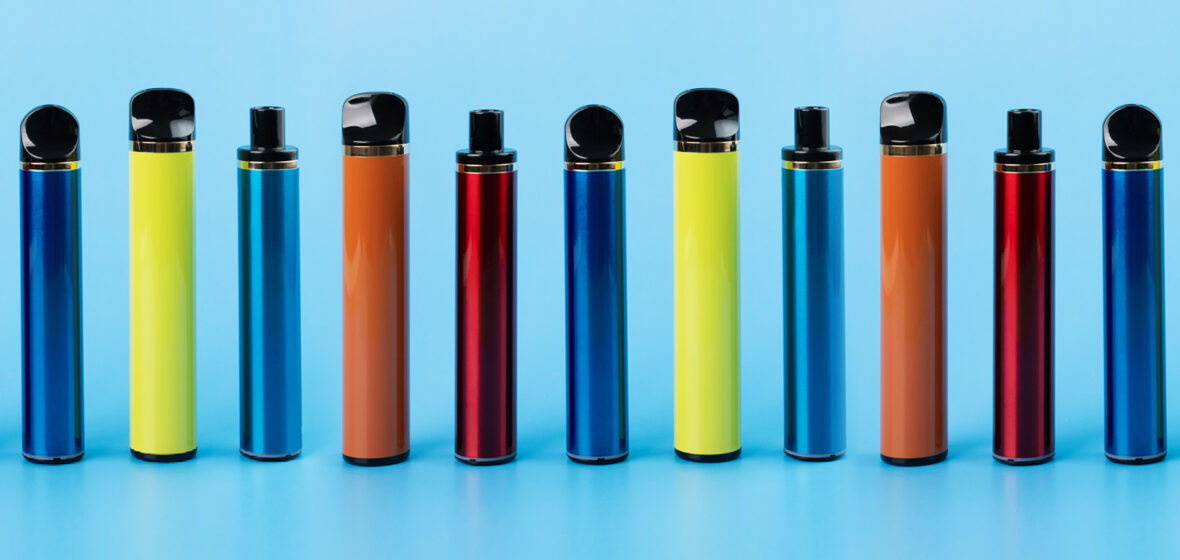‘The genie is out of the bottle and they’re going to have a really hard time getting it back in.’
The health sector is calling for urgent reform after alarm bells were raised about the proliferation of vaping products, and their harmful effects.
Last week, Federal Health Minister Mark Butler warned that easy access to vaping products is putting Australian children at risk of becoming exposed to nicotine at a very young age.
This warning, and Butler’s call for a lid on the multi-million-dollar industry, came soon after the release of alarming research results from the Australian National University’s National Centre for Epidemiology and Population Health (National Centre). The peer-reviewed report, published in the Medical Journal of Australia, revealed that the number of people under 18 smoking vapes is increasing rapidly, and that adolescents smoking vapes are three times more likely to start smoking cigarettes.
Australian Medical Association (AMA) President Professor Steve Robson said this report reinforces the need for “stronger, strictly enforced regulations so we can avoid another public health crisis like tobacco.”
“Vaping is not harmless,“ Robson continued. “It is not safe, it is not part of tobacco control. It has become a scourge in our schools, with parents and educators reporting that it has got out of hand. And we are seeing adults and children alike suffering as a result of vaping.”
In the same week, the Therapeutic Goods Administration (TGA) published the almost 4,000 public submissions made in response to the government’s proposed vaping reforms, aimed at tackling rising youth vaping rates and a flourishing black market.
“All state and territory governments supported tightening border controls for nicotine vaping products, with most also supporting closing the personal importation scheme and requiring import permits,” the TGA summary said.
The AMA welcomed the drive to reform to these laws, referring to the many harmful effects of e-cigarettes and vaping in the National Centre’s report, including lung injury.
‘Vaping has become a scourge in our schools. And we are seeing adults and children alike suffering as a result of vaping.’
LSJ spoke to barrister and medical law specialist Ngaire Watson, who features in the Great Expectations series.
Watson observes that, while nicotine makes cigarette smoking addictive, “vaping manufacturers also use flavouring to make vapes appeal to young people, and these and other additives in the vapes cause serious harm, just as the additives to nicotine in cigarettes cause harm of their own.”
The TGA’s report recommends vape flavours be banned and that individual product packages have warning labels.
Watson adds: “With the ability to accessing vaping products by ordering them online, you’re increasing potential harm to yourself because you don’t know what additives you’re getting in any product. I’ve learnt about really serious and advanced respiratory conditions, lung disease, as a result of vaping. This could be from a number of products, but without controls nobody would have any idea of what the ingredients are. And that means that people can’t necessarily trace the negative information about their product, and therefore access the correct treatment.”
The ease of accessing smoking cessation products is proliferating, Watson says. “There’s been a surge in the illicit products coming into the country that you can buy everywhere, under the counter, though I’ve even seen them openly on display in shops. And they are clearly aimed at the teen market.”
“I actually think that the genie is out of the bottle and they’re going to have a really hard time getting it back in,” she adds.
 Barrister Ngaire Watson
Barrister Ngaire Watson
Watson’s comment echoes Robson’s call for the government to crack down on the black market in vaping products.
And, as a further method of limiting accessibility to vaping products, Robson is calling for changes to the Nicotine and Smoking Cessation Counselling Medicare Benefit Services (MBS). MBS allows Medicare benefits to be paid for telehealth health care services relating to nicotine and smoking cessation counselling, without requiring the patient to have an established clinical relationship with the medical practitioner from whom they are seeking a prescription for vapes.
Robson would like to have the smoking cessation items covered under MBS amended so that only a patient’s usual doctor can prescribe these products to help them stop smoking.
There are heavy penalties (up to $45,000 and up to two years jail) for using or possessing liquid nicotine unless it is prescribed by a doctor to help you quit or cut down smoking. However, fewer than 5 per cent of Australians who vape have a prescription.
Watson says, “if the products are medically prescribed, there is more control over them. Then you will get a product which is pharmaceutically produced and safe and pure and you know what you’ll be getting and how much you’ll be getting of it.
“The current situation is paradoxical: somebody who is trying to quit cigarettes has to go for a doctor for a script, but you can buy nicotine products in a chemist shop without any prescription: there’s a range of them with different concentrations of nicotine in them.
“Vaping products – with tested, safe ingredients – should be regulated like cigarettes are regulated, so that you can go to a supermarket or bottle shop and buy them there. If they were regulated, you’d just buy it, the government would tax it, it would fall under the same legislation, and there would be the same health warnings. And, of course, you would have to be over 18 to buy those products.”
A sign of the times
Though vaping is becoming increasingly common, signage protecting the public from passive smoking is not keeping up.
Last week, The Sydney Morning Herald reported that Sydney councils are looking to update their ‘non-smoking’ signs, as people are vaping in the vicinity of those signs. The vapers’ common excuse is that they are unaware ‘no smoking’ also means ‘no vaping’.
Watson laughs: “People are trying the old plausible deniability line, in my view.”
Vaping is prohibited in areas where smoking is prohibited, under the Smoke Free Environment Act 2000 (NSW). This means that wherever cigarettes are banned, in both indoor and outdoor areas, vaping is also banned. Watson agrees with the action that some councils are taking – add the words ‘no vaping’ to all ‘no smoking’ signs.
“This is probably the most effective way to address the issue of vaping in prohibited areas, Watson says. “It would align with what I’ve seen while flying: the instructions I’ve heard about not smoking on airplanes now include an explicit ban on vaping.”
Taking action with signage may be a way of reducing the incidence and effects of vaping, Watson says. But even if this action is taken, and the suggested reforms are implemented, the genie may well have escaped permanently.




